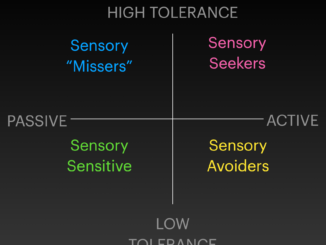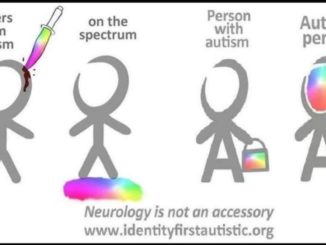The Theory of Monotropism is one explanation of the origin and definition of autism as a natural, neurological wiring. It’s absolutely fascinating, compelling, and makes sense of a whole lot of things, and it stopped me in my tracks the first time I read about it.
Here’s my favorite article on the whole thing — which explains itself 50x better than I’m going to be able to! I wholly recommend going and reading the article itself.
And now for my best attempt at a summary for those who aren’t able to read the article:
We don’t know exactly where autism comes from. It has a genetic component; Autistic parents are more likely to have Autistic children — and actually, often find out in reverse order (i.e., they’re getting their kid a diagnosis and then they realize they had those traits themselves as a child, but less access to resources about it). One Autistic sibling is more likely to have another Autistic sibling, etc. And there are some popular, and massively debunked, myths about environmental factors that “cause” autism.
This doesn’t seek to explain where it comes from, but it does give a definition that unifies the presentation of autism across the spectrum (from a deficits-based POV, you might say “it explains all the symptoms”).
“In a nutshell, monotropism is the tendency for our interests to pull us in more strongly than most people. It rests on a model of the mind as an ‘interest system’: we are all interested in many things, and our interests help direct our attention. Different interests are salient at different times. In a monotropic mind, fewer interests tend to be aroused at any time, and they attract more of our processing resources, making it harder to deal with things outside of our current attention tunnel.”
If you define autism as “a brain with narrowed, powerful focus”, then so many of its components suddenly make sense.
Autistic kid has a hard time transitioning from one thing to another? That’s because their attention was more powerfully invested in the initial thing than a neurotypical kid’s would have been. Breaking away is harder.
Autistic person appears sensory sensitive to someone whose sensory systems fall within “the norm”? That sensory input is being experienced much more intensely and their focus cannot shift to another thing; all of their processing power is being spent on experiencing that sensation. And its opposite: an Autistic person is missing sensation that a NT person would not miss? That is because their attention is so powerfully focused on something else that it misses that sensation entirely.
Conversation and communication is a multi-layered barrage: nonverbal cues, literal words to convey the subject being talked about, the emotion of the words, the biases or underlying meanings that might be beneath the literal words, idioms and metaphors, not to mention whether or not the subject being talked about is actually interesting or engaging…so an Autistic person might hone in on just one of these factors and, for instance, be hearing the literal words but missing the subtext. Or when communicating, their emotion or nonverbal cues might not come across in a way that feels natural to neurotypical people, because their brain is focused on conveying their own meaning or enthusiasm for the content of what they’re saying.
And, of course, special interests and stims barely even need explanation under a monotropic point of view. A brain that’s prone to being intensely focused, passionate, and hyperconnected will naturally hone in on something to be intensely focused on, passionate about, and hyperconnected regarding.



